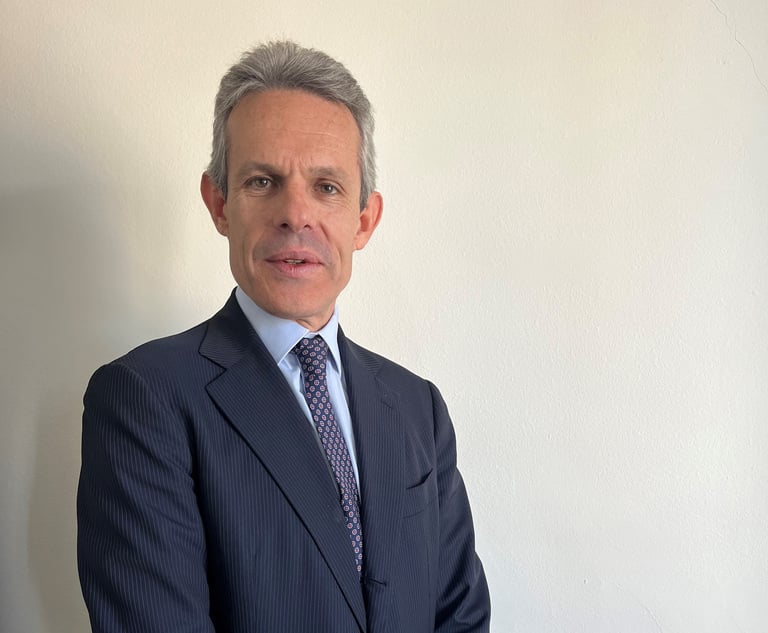In the latest in Law.com International’s series on how senior corporate lawyers cope with the pressures of both their work and personal lives, Sidley Austin partner Max Savoie talks about the particular challenges he has faced over the course of his career.
Savoie, who started his career at Clifford Chance, has since 2021 been a partner in Sidley’s payments and fintech practice. Here, he shares how he has progressed in his career despite suffering a personal tragedy, getting therapy, and using to-do lists to keep stress at bay.
Can you give an example of a time you felt overwhelmed, stressed or particularly low?
I lost my father to suicide during my training contract at the end of his long battle with manic depression. It knocked me back in ways I wasn’t expecting and I often found feelings of anxiety creeping into my working life at seemingly random moments. I had a couple of particular low points early in my career and received treatment for depression, including anti-depressant medication and cognitive behavioural therapy.
I’m now a partner in a specialist practice area (payments and fintech). It’s an exciting area and the things that make it exciting are also what make it challenging. It’s a very fast moving area of law, can get rather technical, and involves difficult judgement calls to guide clients on areas of substantial regulatory risk. As with most legal roles, it can get stressful at times.
Managing my stress levels is something on which I have continued to work throughout my career. It’s extremely important to me to keep doing so, as it helps me to maintain good judgment and the ability to think clearly. It also just makes life a lot easier and the job more enjoyable.
What coping mechanisms do you use in such situations?
I try to stay very well-organised. I have dynamic to-do lists in which I can easily rearrange the order as new requests hit my inbox or others become more urgent. I also have a separate list of tasks that I’ve delegated or referred to colleagues with notes on when to follow up if I haven’t heard back. This helps me to not think about the ten to twenty other things on my list while I focus on item one.
I love running and find it very meditative. I’m also a complete nerd and enjoy history podcasts and books, which are a great escape. I’m no longer the social butterfly I was when I was younger but I have some very good longstanding friendships and strong relationships with my wife and close family—at least I think I do. Ask them! Those relationships are often what carry me through a bad day or week. I used to find it difficult to show my vulnerabilities, even to those closest to me. I’ve gotten better at that and it’s helped a lot.
Have you ever had counseling?
Yes and I still do, regularly. I joined our firm’s London office pilot counselling service as an associate and have continued to use it as a partner. My counsellor is a former lawyer and understands the particular pressures of a legal career in a way that not all mental health professionals can. I find the sessions very helpful. They’re a great lifeline when things get tough and they’re also a good way to take stock and think about what I want from work and life, and the person I want to be.
Do you ever feel guilty about the hours you work? How does that conversation go in your mind?
A lot of the time. I can become self-critical when things take me longer than I expect them to and my friends and family all think I’m a bit nuts for working late and on weekends and holidays. I’m about to become a new father and it’s made me pause to think about how I’m going to manage my time and whether I’ll end up falling short as a father, husband or professional—or even all three. It’s given me newfound respect for friends and colleagues who’ve found a way to make it work and I’m keen to learn from them.
What do you do to manage your work-life balance?
I’m not sure I always get this one right but I’m trying to get better at it. Triaging and prioritising work tasks can help but my work to-do list usually ends up trumping my non-work to-do list. I used to check my work email late into the night and very frequently on weekends and holidays. Now I make a point not to do that unless I’m expecting something time critical to come in.
I check emails periodically and tell colleagues and clients that they can call me if a matter is urgent and then I can rest assured that, if they don’t, I can permit myself to switch off. I also try to make sure that I use my limited free time to do things I really enjoy. One of my favourite quotes is “if you enjoyed the time you wasted, then it wasn’t wasted time”.
What advice would you give to someone who is feeling very stressed at work?
I’ve had a few people ask me this in various forms since I started talking openly about my own mental health challenges. This is going to sound like a classic lawyer’s answer but there isn’t really one solution. That said, I think the first and most important step is to show empathy and understanding.
Lawyers in top firms can be their own worst enemies when it comes to self-criticism and beating themselves up over mistakes. While it’s of course important to deal with risk management issues appropriately, that shouldn’t involve anyone losing their temper or feeling too stressed to resolve things. Sometimes I find the best approach is to acknowledge how stressful the situation is and to reassure people that they are not in it alone. If other people are the cause of someone’s stress, sometimes a diplomatic conversation can go a long way, as the real cause can often be miscommunication or different working styles and expectations.
As I’ve mentioned, I find counselling to be a very helpful tool to manage stress, although I know it isn’t for everyone. For people suffering from acute or long-term stress, I would recommend speaking to a doctor and other mental health professionals. Sometimes the right approach may be to take some time out. I did that once early in my career and it is important to remember that it does not mean ‘defeat’ or ‘giving up’. If you broke a limb, people would expect you to need some time to recover. Addressing significant mental health issues should be no different.










